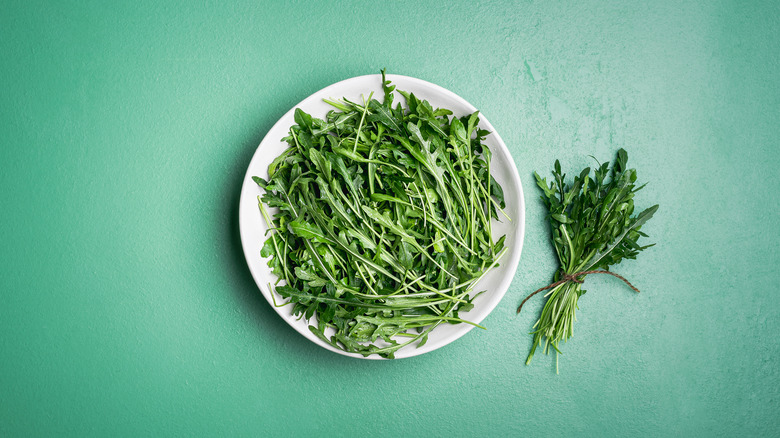The Super Leafy Green No One Eats Enough Of
When it comes to leafy greens, kale, spinach, and romaine are among the most popular. Even cabbage and collards are known both for their health benefits, winning over a crowd. Then, there's arugula. Unless you're eating it in your spring mix, this peppery yet slightly bitter green isn't necessarily at the front of people's minds — but it should be!
Be it in a salad or smoothie, arugula offers much more potential than just serving as a pretty garnish next to a steak. A cruciferous green veggie, arugula falls in the same family as broccoli, kale, and Brussels sprouts, per Medical News Today, and it packs a serious punch in the nutrition department. They also said one cup of arugula gives adults 27.7% of vitamin K needed for the day as well as 3.2% of calcium and 2.5% of vitamin C. The U.S. Department of Agriculture (USDA) says a cup is only 5 calories and that's only the beginning of the benefits arugula provides.
How arugula caters to your overall health
As a cruciferous vegetable, arugula supports a healthy gut. A 2009 study published in The Journal of Nutrition found that the glucosinolates in arugula help increase good bacteria in your gut microbiome and decrease the bad.
Cruciferous vegetables are also ideal for supporting a healthy heart, as revealed in a 2021 study published in the European Journal of Epidemiology. Results of the study showed that eating 1 cup per day of nitrate-rich green leafy vegetables like arugula has the potential to lower risks of cardiovascular disease.
Nitrates along with vitamin K, folate, and lutein, among other nutrients provided by arugula, also contribute to mental health. A 2018 study in Neurology demonstrated that leafy green vegetables can help the mind stay sharp as you age. Participants who ate 1.3 servings per day resulted in being mentally the equivalent of 11 years younger.
Another thing that declines as we age is our vision, but arugula can help with that, too, because of its lutein content. Nutritionist Simon Hill told Mind Body Green that since lutein is a fat-soluble nutrient, adding avocado, olive, nuts, or seeds, will help ensure the body absorbs it all.


